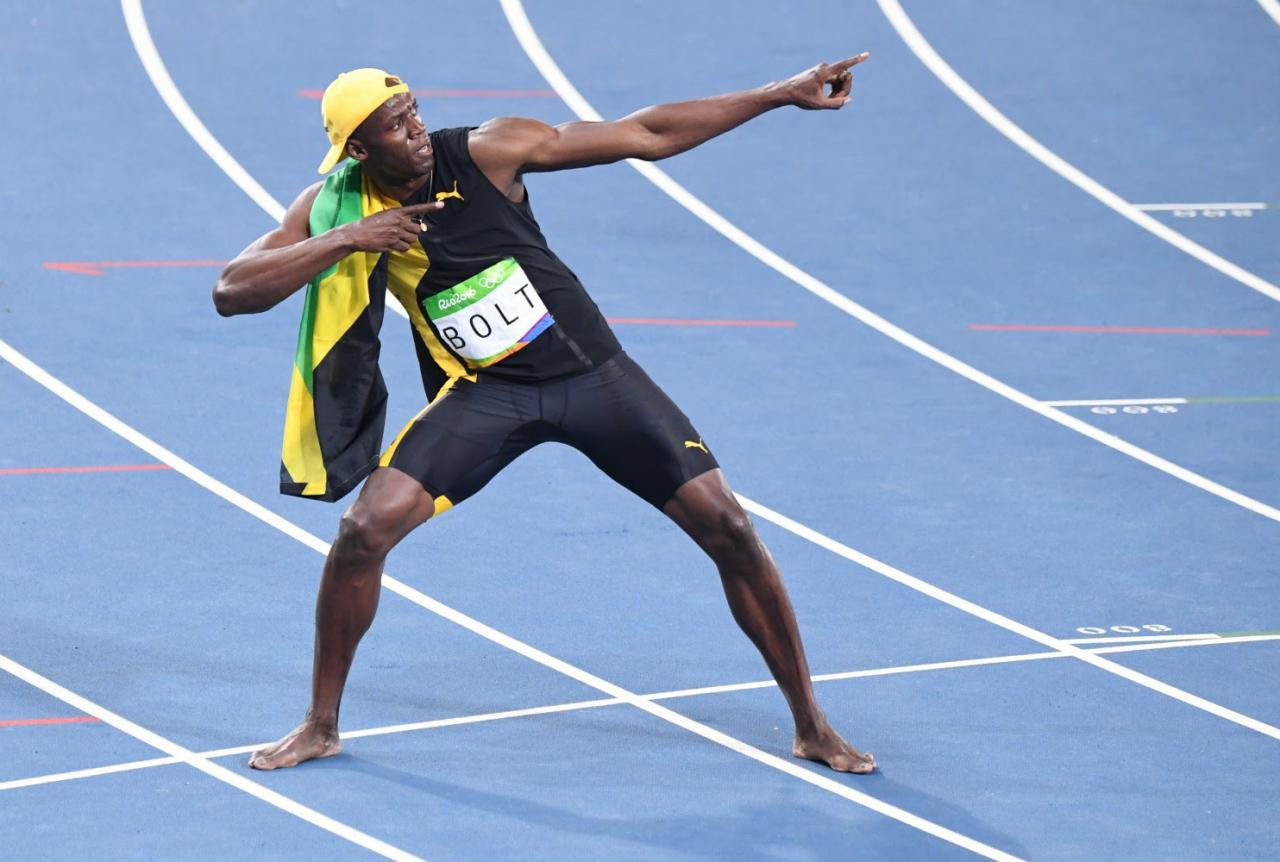By Jerry Brewer

It was fitting that the Jamaican sprinter had already taken off his shoes. In the 100 meters, he has nothing left to prove. The retiring champion became the first athlete, male or female, to win three straight Olympic gold medals in the shortest and most swaggering event in the sport. After Bolt toyed with another outstanding field and crossed the finish line in 9.81 seconds Sunday night, after he foiled Justin Gatlin once again, he took his speed and his longevity to a place that not even exaggeration can eclipse.
For the fleet-footed, dominance is supposed to be fleeting. The world’s fastest man (woman, too) is a hot-potato title. It’s as if these sprinters get passed during their victory lap.
But Bolt is different. He always has been, ever since the 6-foot-5 phenomenon ran a 9.69 in Beijing during the 2008 Olympics, declaring his greatness with chest-pounding exuberance the final 20 meters.
Two Olympics later, Bolt still owns the 100, his long legs seemingly taking fewer than 10 strides to post times under 10 seconds.
“That puts him among the legends,” said fellow Jamaican sprinter Yohan Blake, who finished fourth. “You’re talking about Muhammad Ali and all those other guys. It’s not easy to do what he did over years. Four years and four years and four years, it’s not easy.”
Bolt, who now has seven career gold medals, is so special that 9.81 seconds felt slow. For him, it was. He has finished faster 13 times in his career. Before Bolt, the Olympics hadn’t even seen 9.81. His standard is so high because he ran that 9.69 in Beijing and followed with a 9.63 four years later in London, not to mention his 9.58 world record.
In the previous two Olympics, Bolt had won races in which the silver and bronze medalists recorded personal bests. It means he has elevated the competition. He has pushed everyone to go faster, but when they do, he has had something extra.
“He just keeps on running fast and keeps on winning,” Blake said.
[Wayde van Niekerk sets a 400-meter record that nobody saw coming]
Entering the race, Bolt and Carl Lewis were the only men to win 100-meter gold in back-to-back Games since the event debuted in 1896, the first modern Olympics. Even crazier, there are just 10 runners who have won multiple medals, of any color, in the Olympic 100 meters. In 1988, when Lewis became the first repeat champion, he actually crossed the finish line second, but Ben Johnson was disqualified for doping.
The women’s 100 meters became an Olympic sport in 1928. Just three women have gone back to back: Wyomia Tyus, Gail Devers and Shelly-Ann Fraser-Pryce . On Saturday night, Fraser-Pryce, who is 29 and four months younger than her countryman Bolt, attempted the 100 three-peat. She sported yellow and green hair — Jamaica’s colors — for the occasion. But she finished third. She handed her crown to her 24-year-old training partner, Elaine Thompson. Tori Bowie, 25, won the silver.
“In 2008, it was my time,” Fraser-Pryce said, bowing to Thompson. “In 2016, it is her time.”
Champions fade in this event. There are few glorious send-offs. Longevity only reveals the superiority of Father Time. There is always someone younger, someone faster. Veteran savvy has an early expiration date. It spoils faster than dairy.
By track standards, Lewis had a Michael Phelps-ian run. He owns 10 medals, nine gold and one silver . Six of them are for sprinting. He was dominant as a 23-year-old in Los Angeles in 1984, and he was still relevant during the 1996 Atlanta Games, winning a remarkable fourth straight Olympic gold in the long jump. But for as long as he lasted, his 100-meter reign ended well before the rest of his greatness ceased.
By the 1992 U.S. Olympic trials, Lewis had gone from the back-to-back Olympic champion to a sixth-place non-qualifier. He was 31, and it was over. In the 1996 trials, he finished last in the 100-meter final.
Later that year, Lewis captured his ninth Olympic gold by winning the long jump. Then there was a nostalgic push to include him on the 4×100 relay team so that he’d have an opportunity to win No. 10. It prompted outspoken sprinter Jon Drummond to denounce a legend that he grew up idolizing.
“He got butt-naked last at the trials,” Drummond said.
This was nothing like the Kobe Bryant retirement tour.
Sprinters run fast and run away faster. The shorter the sprint, the shorter the dominance. Yet there was Bolt, unbeatable despite a balky hamstring that threatened to keep him out of Rio and periodic bouts of boredom.
No sprinter has ever risen to the occasion as consistently and impressively as Bolt. He proved that one more time Sunday.
“Somebody said I can become immortal,” said Bolt, who will still compete in the 200 and the 4×100 relay during his Olympics swan song. “Two more medals to go, and I can sign off. Immortal.”
He’s already immortal in the 100.
Get the top Olympics news by email
Major news and analysis from Rio, delivered to your inbox as it happens.
Shoes off, hat turned backward, flag over his shoulder, he struck his famous Lightning Bolt pose one more time. The image is frozen, eternal. Make it into a statue.
Usain Bolt retired as the world’s fastest man. He just gave a transient title a permanent home.














